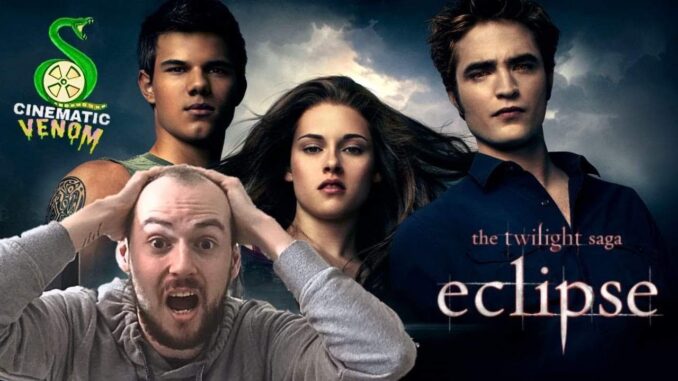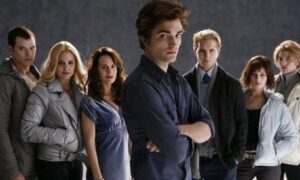
Why is Twilight so addictive?
Chrystal Johnson didn’t think there was anything unhealthy about her all-consuming fixation with “The Twilight Saga” — until she discovered it was sucking the life out of her marriage.
“I found poems my husband had written in his journal about how I had fallen for a ‘golden-eyed vampire,’ ” says Johnson, a 31-year-old accountant from Mesa, Ariz, who became so enthralled by the blockbuster series of young adult novels and movies that she found herself staying up all night, re-reading juicy chapters and chatting about casting news and the are-they-or-aren’t-they romance between the stars of the films, Kristen Stewart and Robert Pattinson.
“ ‘Twilight’ was always on my mind, to the point where I couldn’t function,” Johnson says.
Anyone who has ever peeked inside a comic-book convention or gone to a late-night screening of “The Rocky Horror Picture Show” knows that some pop-culture fans aren’t exactly known for their moderation. But there are some key differences distinguishing “Twilight” groupies and their seemingly bottomless obsession from that of other entertainment junkies.
“A lot of fans engage in obsessive behavior, but to the extent that it’s damaging to their offline relationships, that’s pretty uncommon,” says Nancy Baym, associate professor of communication studies at the University of Kansas and author of “Tune In, Log On: Soaps, Fandom and Online Community.” “When you talk about someone getting up at 4 a.m. and sacrificing marriage, that sounds like addictive behavior.”

Like its immortal vampires, “Twilight,” with its archetypal allure of brooding bad boys and forbidden romance, has been able to transcend age, creating devotees (largely women) ranging from tweens to AARP members. Add in the instant access of the Internet, offering 24/7 escape into a “Twilight”-saturated universe, full of tantalizing info-nuggets and a community of like-minded souls, and the result is a growing number of people whose love for the franchise seems to have crossed over from casual to compulsive.
For the latest illustration of “Twilight” mania, look no further than the hundreds of fans who pitched tents and slept outside for days in front of the Nokia Theatre in downtown Los Angeles in hopes of catching a glimpse of one of the stars at Thursday’s red-carpet premiere for “Eclipse,” the latest installment of the franchise, which opens nationwide June 30. “This is the first time I’ve been this passionate about anything,” says Kelli Chavez, a 39-year-old mom who drove in from Sylmar. “I’ve read each of the books at least eight or nine times and I’ve watched each of the movies over 300 times apiece.”
Chavez doesn’t hesitate when asked whether anyone in her life resents her passion for “Twilight.” “My 6-year-old son,” she says soberly. “I definitely need to go to Twilighters Anonymous about it.”
There is a Twilighters Anonymous, but it’s not a 12-step group. Rather, it’s a website for fans who want to feed their habit, not kick it. But an increasing number of confessionals have been popping up on community forums from women concerned about their tendency to neglect important aspects of their daily lives to dip into the fantasy that is Stephenie Meyer’s operatic saga about Bella (Stewart, in the films), a small-town everygirl whose je ne sais quoi mojo attracts the warring affections of a pair of metaphysical hunks: a vampire, Edward (Pattinson), and a werewolf, Jacob ( Taylor Lautner).
Advice portals such as Yahoo Answers have been teeming with desperate-sounding pleas such as, “How to calm my Twilight addiction, help me please!?” Some sites’ chat forums have become makeshift support groups, full of panicked testimonials. “It’s like a drug,” writes one concerned fan with the username Ally. “I have to read it or I break down crying. It’s awful. I don’t want to tell anyone about it. But I fear it’s unhealthy.”
Though “Twilight’s” success is often attributed to giddy teenage girls who show up in packs for repeat viewings of each film, the franchise has benefited from being the rare pop-culture juggernaut to tap into the passions of middle-age women.
“I check the Internet all day long for ‘Twilight’ news, from the minute I wake up until I go to bed at midnight,” says Joyce Swiokla, 50, a former engineer who runs the website CullenBoysAnonymous.com. “If there is a chemical that’s released when you’re falling in love, your brain has it when you’re reading or watching ‘Twilight.’ You get that utopic feeling of first love and you want to experience it over and over again.”
